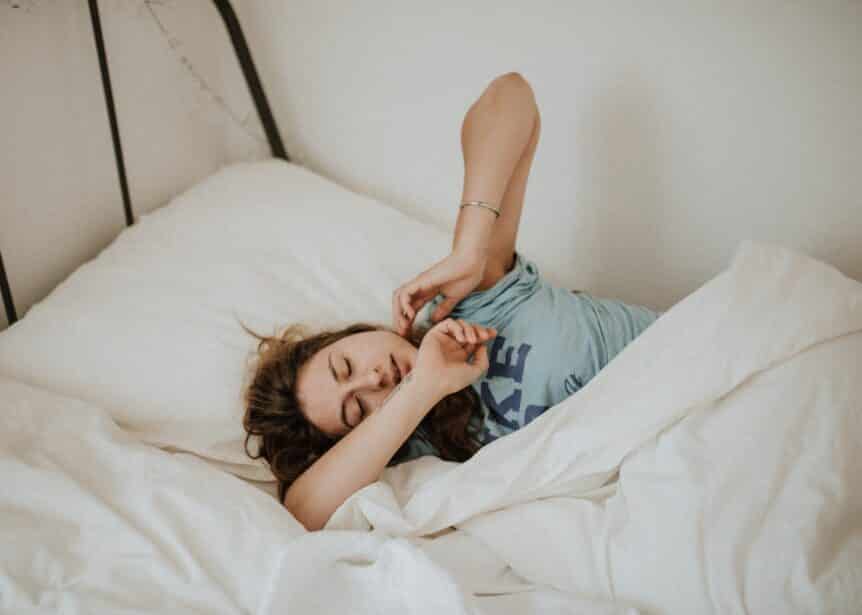You might think you’re alone when it comes to night anxiety, but it can actually be quite common. Think about it — you’ve been running around all day juggling friends, family, work, and hobbies. It’s finally time to get into bed and tune out the world, when suddenly anxiety hits you like a brick wall. You might wonder why this is happening. It seems like when you finally have a moment of peace and quiet, your body is working against you. But that’s just it — you’ve been a busy bee all day, giving your brain and body no free time to process what’s going on. So, it decides to all pop up at night the second you take a pause. While this is common, it can be really frustrating. Let’s talk about how to cope with night anxiety, so you can get back to restful sleep that leaves you feeling recharged, rather than drained.
What does anxiety feel like?
Before we get into how to calm night anxiety, it’s important to know if this is what you’re dealing with. While everyone experiences anxiety differently, common symptoms can include:
- Feeling nervous, restless, or tense
- A sense of danger or panic
- Increased heart rate
- Rapid breathing
- Sweating and/or trembling
- Feeling weak or tired
- Trouble concentrating
- Trouble falling and staying asleep
- Gastrointestinal problems
If you’re dealing with these symptoms, talk to your doctor or a mental health professional to identify a treatment plan that fits your unique needs.
How to calm night anxiety
The good news is, there are multiple things you can try to calm your anxiety. So if one strategy doesn’t work for you, we encourage you to try the others.
Start a sleep hygiene routine
Sleep hygiene is a fancy way of addressing a bedtime routine. It’s key to set yourself up for success before you head to bed — so you’re giving yourself the best possible chance to fall asleep, and stay asleep worry-free. Here are a few things you can start doing as part of your sleep hygiene routine:
- Keep your bedroom for bedroom activities only: Using your bedroom for work, eating, or anything else that’s not sleep-related can confuse your brain when it’s time to wind down.
- Manage your environment: Keep it clean, screen-free, and make it a cozy place that you actually want to unwind in at the end of the night.
- Turn off electronics: Give yourself 30 minutes of device-free time before bed. This will give you enough time away from blue lights that can block melatonin production, and also help decrease brain activity.
- Stay consistent: Practicing this routine every night will help you get into the swing of things. Consistent sleep hygiene can quickly translate into consistent restful nights.
Practice Mindfulness
Practicing mindfulness through meditation is a great way to wind down after a busy day, and reduce night anxiety. Meditating for just 5-10 minutes before bed can be hugely beneficial in calming your body and brain to get you ready for bed. Research has found that meditating consistently can actually reduce anxiety and depression. If you’re not sure how to start meditating, apps like Calm and Headspace can be a guide and give you the tools to incorporate mindfulness into your lifestyle.
Speak to a counsellor
You may be experiencing night anxiety due to unprocessed fears, worries, or traumas. That’s why speaking to an anxiety counsellor may help boost your quality of sleep. Working through thoughts can lead to more peace of mind in all aspects of life. So when it comes to falling asleep, a calmer mind will have an easier time than a worried mind. Wellin5’s team of counsellors can help you identify the thoughts that are blocking you from getting a great night’s sleep.
Get moving
Exercising during the day may help you sleep better, and longer, at night. It can steady your mood, reduce overall stress, and fight the restlessness that pops up when trying to fall asleep. Naturally, when our mood is steady, we’re eating well, and our minds feel at ease, sleep will come more naturally.
Avoid stimulants
What we put in our bodies during the day can affect our quality of sleep at night. Too much caffeine during the day in drinks like coffee, tea, energy drinks, and sodas keep us going during the day — but at the expense of restful sleep in the evening. To curb this, avoid drinking caffeine late in the day. You may be thinking alcohol at night, then, is a good idea to help with drowsiness. While alcohol may make you fall asleep faster, it can negatively impact your sleep quality. So it’s best to avoid this before bed.
It’s possible to calm night anxiety
Nighttime is YOUR time. It’s the pause you deserve to rest, regroup, and wake up ready to take on the next day. With the right steps, it’s possible to calm night anxiety — so you can feel your best. If you’re looking for support to calm your mind, Wellin5 can pair you with a counsellor that meets your needs. Get started today.

